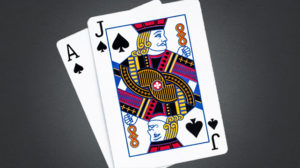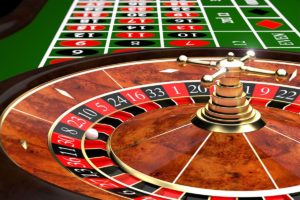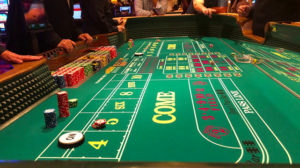Applying Game Theory to Gambling


Taylor Smith is a skilled iGaming writer and content editor. He started writing for GamblingNerd.com in 2017 and became a content specialist in 2022. He majored in radio and film in college. After a t...
Read Full Bio
Shaun Stack is a senior writer at Gambling Nerd. His gambling articles have appeared in the Daily Herald, Space Coast Daily, and NJ 101.5. He’s a football betting expert, a Survivor fan, and a skill...
Read Full BioGame theory isn’t just for economists. It’s also one of the most powerful tools any gambler can use to outthink their opponents or even tilt the odds ever so slightly in their favor.
In this guide, we’re diving deep into game theory, how it works across both casino games and sports betting, and why understanding it might make you a sharper, more strategic player.
Nerd Picks of the Month
-
-
-
-
+6 more
-
-
-
-
+9 more
-
-
-
-
+12 more
-
-
-
-
+7 more
-
-
-
-
+8 more
What is Game Theory?
At its most basic, game theory is the study of strategic decision-making. It takes a deeper dive into how people make choices when the outcome depends not just on their actions, but also on the actions of others.
Let’s use poker as an example. Your hand matters, but your ability to read your opponent and react strategically can be just as important.
In gambling, game theory comes into play whenever your outcome isn’t purely random but involves decisions and counter-decisions—whether it’s bluffing in poker or choosing when to double down in blackjack.
How Can You Apply Game Theory to Gambling?How Can You Apply Game Theory to Gambling?
While many casino games are games of chance, several gambling formats allow players to make meaningful strategic decisions. That’s where game theory shines.
Below, we’ll break down how to apply game theory principles to the most popular gambling games.

Poker Game Theory
Poker is the poster child for game theory in gambling.
The foundational concept here is the Nash equilibrium—a strategy where no player can improve their expected outcome by changing their strategy while the others keep theirs unchanged. In poker terms, this means finding a balance between bluffing and value betting that makes you unexploitable.
Game theory optimal (GTO) strategies help players avoid being predictable. If you always raise with strong hands and fold weak ones, opponents catch on. GTO poker encourages mixing up your play so opponents can’t find a clear pattern. It’s not always the most profitable in soft games, but it’s a must-have tool if you’re a serious player.

Blackjack Game Theory
Unlike poker, blackjack pits you against the dealer, not other players. But game theory still plays a role, especially when you add in card counting and basic blackjack strategy.
You can map out blackjack decisions—hit, stand, double down, or split—based on probability trees. Basic strategy is just a simplified form of game theory: it tells you the mathematically optimal move based on your hand and the dealer’s upcard.
While casinos generally frown on card counting in blackjack, applying strategic principles to blackjack can turn a negative expectation game into a winning proposition if you’re disciplined.

Baccarat Game Theory
Most consider baccarat to be a luck-based game, but there’s a tiny sliver of strategy involved.
Game theory doesn’t play a major role here because players have no real decision-making once the cards are dealt. However, banker vs. player bets have different house edges, and recognizing these differences is a step toward smarter gambling.
If you’re applying game theory here, it’s more about bet selection and money management than decision trees. Keep it simple: bet banker, avoid tie bets, and don’t fall for superstitions.

Roulette Game Theory
Can you use game theory in a completely random game? Not in the traditional sense, but you can use game theory to manage your behavior and avoid getting trapped in betting systems that are doomed to fail.
Players often use the Martingale or Fibonacci systems in roulette. These aren’t game theory-based; they’re betting systems built on gamblers’ fallacies.
Game theory would advise minimizing risk, recognizing long-term expectations, and avoiding emotionally driven bets. In short, roulette is fun, but you can’t out-strategize the wheel.

Craps Game Theory
Craps has layers. While much of it is random, you can still optimize the Pass Line, Don’t Pass, and Odds bets. Game theory in craps focuses on bet efficiency. In other words, getting the most bang for your buck.
By sticking to bets with low house edges and avoiding sucker bets, you’re applying a version of strategic thinking. Game theory won’t help you predict dice, but it can help you make mathematically superior decisions over the long run.

Sports Betting Game Theory
Sports betting is where game theory comes alive. Bettors are essentially trying to outsmart the market: other bettors, sportsbooks, and algorithms. You’re looking for inefficiencies and attempting to exploit situations where the public or oddsmakers are wrong.
Think of sports betting like a game of chess. If the public is heavily betting on one side, sharp bettors might take the other. You might fade overreactions or find arbitrage spots where odds differ between books. The goal? Make decisions based on value and long-term profitability, not gut instinct.
For a full breakdown of betting smarter, visit our sports betting guide.
Alternatives to Game Theory
Gambling game theory can feel intimidating. If calculating mixed strategies and equilibria isn’t your thing, don’t worry. There are other tools in the smart gambler’s toolkit:
- Implied probability: Learn how to convert betting odds into win percentages to assess value.
- Expected value (EV): Figure out whether your bets are profitable over time.
- Betting systems: Understand what systems like Martingale do.
- Psychological edge: Know how emotions and tilt can wreck good strategy, and how to avoid it.
These approaches are great stepping stones for building a smarter approach to gambling.
Game Theory Books and Additional ResourcesGame Theory Books and Additional Resources
Looking to nerd out even more? These resources will help you go deeper into the strategic side of gambling and game theory:
- “The Theory of Games and Economic Behavior” by John von Neumann and Oskar Morgenstern – The original bible of game theory.
- “The Mathematics of Poker” by Bill Chen and Jerrod Ankenman – A must-read for GTO poker players.
- “Thinking in Bets” by Annie Duke – More about decision-making under uncertainty, but still incredibly relevant.
- “Thinking, Fast and Slow” by Daniel Kahneman – A deep dive into how we make decisions and where our intuition may lead us astray.
- GTO Wizard – Hands-on tool for learning and applying poker game theory strategies.
Apply Game Theory to Your Gambling Strategy
Gambling game theory helps you approach games with more than luck on your side. It gives you a framework for thinking, predicting, and acting strategically.
Whether you’re playing poker, betting on sports, or just trying to avoid the worst bets at the craps table, even a basic understanding of game theory can improve your results over time.
Ready to put it into action? Check out our favorite online sportsbooks and try your hand at sports betting with your new strategic edge.

Taylor Smith is a skilled iGaming writer and content editor. He started writing for GamblingNerd.com in 2017 and became a content specialist in 2022. He majored in radio and film in college. After a transition to writing about online gambling, he now has over ten years of experience in the field. Yes, he’s heard your Taylor Swift jokes.








